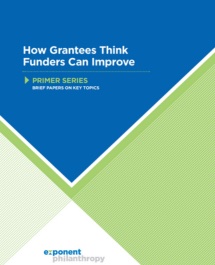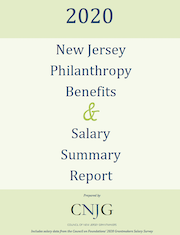Site Search
- resource provided by the Forum Network Knowledgebase.
Search Tip: Search with " " to find exact matches.
The Fund for Women and Girls of the Princeton Area Community Foundation has awarded a record $325,000 in grants to local nonprofit organizations.
This funding is the largest amount awarded in any cycle of the Fund’s more than 20-year history and includes a first-time award for the Liz Gray Erickson Memorial Grant, a 3-year grant given in memory of the Princeton resident who served as the chair of the Fund from 2012 to 2014.
“Thanks to the generosity and commitment of our Fund for Women and Girls members, we’ve awarded more than $1 million in grants to more than three dozen nonprofits in the last five years,” said Jenifer Morack, Fund Co-Chair.
Fund members pool their donations, then recommend grants to be awarded annually to local nonprofits. Isabel Zisk, Fund Co-Chair, said making a gift to the Fund is incredibly effective. Individual donations create a leveraged pool of funding that greatly benefits nonprofits working to impact the well-being of women, girls and communities in our region.
“We do what no individual donor has the expertise, time or access to do,” she said, explaining that the Fund’s Grants Committee members read dozens of applications and conduct site visits with nonprofits. “Because of some very generous gifts, this year, we have the honor of awarding the Liz Gray Erickson Memorial Grant. With her visionary leadership, Liz planted the seeds of our grantmaking focus.”
A CNJG member queried our listserves with the question "Does anyone have templates that can be used and/or shared related to grant approval letters and terms and conditions related to COVID-19 grants?" CNJG compiled the answers from responding members.
You may have seen an email or two about this, read an online article, or clicked on a social media post. Perhaps you’ve even seen a demo already! But, later this month, you will actually get to experience it for yourself!
No, it’s not the latest Labubu. I’m talking about the New Jersey Philanthropy Hub – powered by Impala.
Theresa and I, (yes, this is Craig W. writing this) have been working with our friends and colleagues at the New Jersey Center for Nonprofits to bring the Impala platform to EVERY nonprofit and EVERY funder in New Jersey for free for 36 months!
The Center and CNJG are launching the New Jersey Philanthropy Hub, powered by Impala, on two different dates:
- For nonprofits and their fundraising activities: Thursday, October 23 at noon
- For grantmakers and their staff and board: Friday, October 24 at noon
Both events will be a Zoom webinar.
CNJG will soon provide our members with language you can use to email your nonprofit partners about the nonprofit launch on October 23. Over 400 nonprofit professionals have already registered for the launch!
We thank CNJG member The Tepper Foundation, who through the Jewish Funders Network, introduced us to the platform. After seeing a demo, we were intrigued, and through a former PIO (Philanthropy Infrastructure Organization) colleague who now works at Impala, we started the process of understanding what this platform could do for the social sector here in New Jersey.
One small example relates to Goal #1 from our Doing Good Better initiative, which calls to center equity. We at CNJG asked: How can funders find marginalized, underfunded, and impactful organizations? How can we help give better access to funders for those same organizations? Especially with the massive cuts in government funding, we were determined to give free access to this tool for EVERY nonprofit and EVERY grantmaker in the state to help find more opportunities within New Jersey and from funders outside New Jersey.
We thank our members that have funded this three-year initiative: The Campbell’s Company, the Community Foundation of New Jersey, F.M. Kirby Foundation, Grunin Foundation, Princeton Area Community Foundation, PSEG Foundation, and the Robert Wood Johnson Foundation. This initiative is not inexpensive, yet it should be highly impactful – positively affecting every nonprofit in the state, even if they are not in your funding area! There is always room for more financial support, and we would welcome a conversation with you to also support this initiative. If you want to learn more, please call or email me.
Impala can help your grantmaking efforts by:
- Building sector-specific reports to see disparities in funding.
- Reducing the paperwork burden for your nonprofit partners (Doing Good Better Goal #4!) by using the data already here.
- Streamlining your due diligence efforts with an easy-to-digest and visually engaging interface, making it easy for trustees and/or grant reviewers to review finances of potential grantees.
- Finding other national funders with whom you can partner.
At our Annual Meeting of Members and Holiday Gathering on December 10, the workshop will focus on the Impala platform. [Registration opens very soon!] Bring your laptop, so you can follow along, and tweak your organization’s profile! The New Jersey Center for Nonprofits will also have an Impala demo at their conference on December 3.
We hope that you can join us for the launch event for grantmakers on the 24th, and please invite your nonprofit partners to the launch event on the 23rd.
With thanks,
Craig Weinrich
Senior Director, Member Experience
& Senior Executive during the remainder of Theresa’s sabbatical through mid-October


The 2020 New Jersey Philanthropy Benefits & Salary Report provides a valuable benchmarking resource. Developed and compiled for CNJG members exclusively, the report presents comprehensive benefits data specific to New Jersey's grantmaking community, alongside data from the Council on Foundations' annual salary survey. Produced every three years, this benchmarking report is a highly valued benefit of your membership in the Council of New Jersey Grantmakers. Thank you to the CNJG members that completed the benefits survey earlier this year that enabled us to produce this report.
The first section, 2020 Benefits Summary Report, includes benefits data for the 2020 calendar year and covers employment, leave benefits, insurance benefits, and more. We are delighted to also present for the first time in this triennial report, demographic data on the boards and staffs of those that responded. The second section, 2020 Grantmaker Salary Tables: New Jersey, Mid-Atlantic and National Data provides data on compensation across a wide range of positions and grantmaking entities. Thank you to the CNJG members that completed the Council on Foundations’ annual survey on salaries that enabled us to produce this section of the report.
Under-resourced communities are going without because nonprofits can't meet demand. Americans —particularly those in low-income communities—are still struggling to secure jobs, affordable housing, and healthcare. Nonprofit Finance Fund’s 2015 State of the Nonprofit Sector Survey focuses on the underlying causes of these dynamics by exploring the programmatic, financial, and operational issues facing nonprofits across the U.S.
NFF launched the Survey in 2008, when economic crisis threatened the viability of many organizations. Seven years later, results from 5,451 respondents show some indications of recovery, stabilization, and growth. Nonprofits are adding jobs, engaging in strategic conversations such as leadership succession planning, and looking to retain their workforce. Yet as they raise their sights from the focus on short-term crisis, many are confronting the troubling reality that current practices cannot sustain organizations in the long-term or meet the needs of the communities they serve now. Many organizations have stumbled out of crisis looking to make the necessary investments to secure their long-term future. And it is a hard road ahead.
A new nonpartisan resource, Foundation Funding for U.S. Democracy, provides data about foundations and their democracy-related grantmaking in a structured, contextualized, and visual format. Foundation Funding for U.S. Democracy was created through a partnership of eight funders in the field, including the Rita Allen Foundation, and is being developed by the Foundation Center.
The tool allows funders, nonprofits and other interested parties to sift through data on the $1.7 billion (and counting) granted by foundations to strengthen civic engagement in the United States since 2011. For the first time, we have an open tool for visualizing who gave how much to whom for what. While the tool and the data will continue to develop, it already gives a tremendously useful view of opportunities for greater partnerships and knowledge in the field—both for funders and for the organizations, small and large, established and emerging, working to strengthen our democracy. As Kelly Born of the Hewlett Foundation, another of the project partners, writes in a post introducing the tool: “As useful as this data set and visualization will be for foundations already working in the field or new funders considering entering it, the real killer app for this work will be to help grant seekers.”
The New Jersey Arts and Culture Renewal Fund has awarded nearly $600,000 in grants to nonprofits that will use the funds to help artists, teaching artists and history professionals recover from the financial devastation of the pandemic.
The grants, the third round of funding awarded by NJACRF, brings the grant total to more than $4.5 million in support to 172 nonprofits in the arts and culture sector. The fund, founded in 2020 as a way to help the arts during the pandemic, is hosted by the Princeton Area Community Foundation.
Jeremy Grunin, co-chair of the NJACRF and president of the Grunin Foundation, said the grants correspond to a name for the organization – which now views itself as a vehicle for renewal.
“Recovery to renewal signifies a shift from crisis support to an opportunity to change the actual system itself,” he said. “We always knew that smaller nonprofits most vulnerable to disruptions and those historically underfunded prior to the pandemic were going to need longer-term support.
“The New Jersey Arts and Culture Renewal Fund will create an additional resource of fast and flexible funding that wasn’t previously available – helping to build a much stronger arts, cultural, and historical ecosystem in New Jersey.”
The grants announced today total $592,501 and will be awarded to nonprofits that will act as intermediaries, re-granting the funds to artists, teaching artists, and history professionals.
The Philadelphia 76ers, looking to make an even greater impact in the community in which they train, are making a donation of $120,000 to the Camden County Police Department, the largest private donation ever.
The donation, made through the Sixers Youth Foundation, will fund youth fitness initiatives throughout Camden city, as it will be used to enhance and expand several programs in the Camden County Police Department’s Village Initiative, including the open gym and resource nights, Camden officials said.
Camden County Commissioner Director Louis Cappelli was floored by the gesture — but noted it follows the effort the team has been making for some time.
“From the start, this agency has been focused on community engagement and facilitating a lifelong dialogue in order to become part of the fabric of the city,” he said. “This investment by the Sixers underscores the importance of the work we do with our residents on daily basis with a focus on our youth in Camden.
“I want to thank them for walking the walk and being an important part of our village here in Camden County.”
